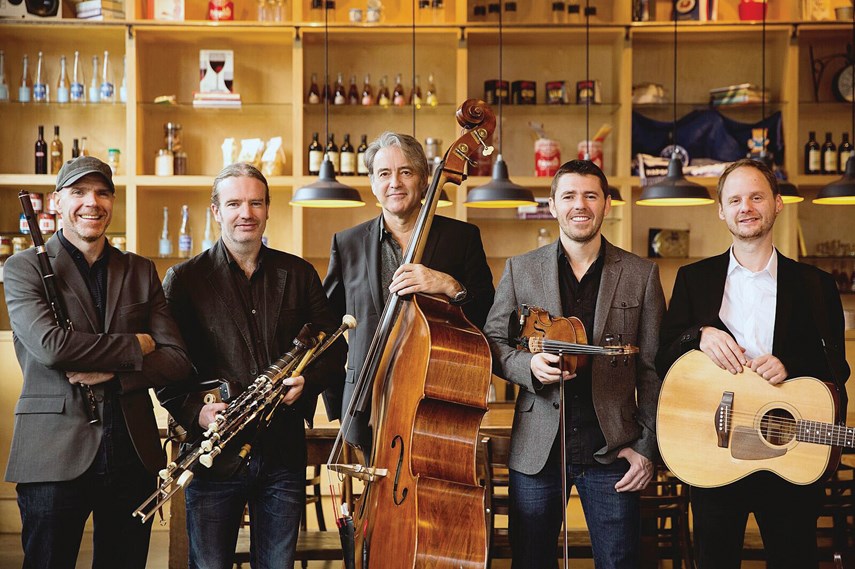Lúnasa, Grosvenor Theatre at Kay Meek Arts Centre, West Vancouver, March 27, 7:30 p.m.
Outside of maybe Ireland, there’s perhaps no better place than New York City when it comes to celebrating St. Patrick’s Day.
Lúnasa, billed as “the hottest Irish acoustic group on the planet,” according to the New York Times, is coming off the heels of performing a St. Paddy’s set in the Big Apple the night prior when the North Shore News catches up with the band. The five-piece group are now safely stowed away in their tour bus as they head to their next destination.
“We’re very lucky that there’s an energy that’s unique to New York City,” says Kevin Crawford, who joined Lúnasa as a flute and whistle player in 1997 and has since emerged as the band’s unofficial spokesman. “St. Patrick’s in New York City is a big deal. … It was a great atmosphere there last night.”
Lúnasa’s no stranger to life on the road, having taken their brand of traditional-meets-contemporary Irish folk music across the world over thousands of shows during a more than 20-year run, but Crawford insists they only “let people think that we’re workaholics.”
“It’s a full-time concern, there’s no doubt about that, but we’re not doing the Bob Dylan on it yet,” he says, alluding to Dylan’s constant touring schedule popularly referred to as the Never Ending Tour.
The band went on the road and performed “like crazy” for the first 10 years of its life, says Crawford, before slowing things down for the next five or so years. Then things started to pick up again. A desire to once again start touring more coincided with an influx of show promoters looking to book the band to play – and this occurred during a period when the band was opting to release less new music as well.
“It’s nice that people are always calling and booking us, it’s always a thrill that people still want you to perform – and we’re not great at saying no,” he says.
Seemingly reinvigorated, Lúnasa put out CAS last year, its first new album of music in almost a decade. It was the band’s 20th anniversary, and when they started working out how they would celebrate the occasion, maybe with a new release, they settled on doing something that didn’t rely on their penchant for instrumental-only songs, according to Crawford.
“Once we came up with the idea of doing something new in terms of having some kind of vocal presence on the album, then all of a sudden we thought we’ll now have something new to say and we can really weigh in behind this,” says Crawford, of the band’s decision to invite singing guests, such as singer-songwriter Natalie Merchant, to perform on the new record.
As would be expected from a renowned Irish acoustic band, Crawford and the other four members of Lúnasa, Seán Smyth, Trevor Hutchinson, Cillian Vallely and Ed Boyd, revere the musical heritage they’re all so adept at channeling night after night, album after album.
“We are very lucky within the Irish tradition that there is a huge well we can keep dipping into and we can keep unearthing gems,” says Crawford. “The beauty of it is that it’s a very healthy, living vibrant tradition, so there’s people adding to it all the time, including ourselves. We write a lot of our stuff now too.”
Crawford, who was born in England to Irish parents, explains how he was drawn to the music of his parents’ homeland from a young age and, when he was growing up, generally eschewed much of the popular music, culture and sports that young British kids were enamoured with.
“I just used to come home from school and put on LPs of ceilidh bands and solo fiddle players. I was completely nerdy and crazy,” he says.
At 20, Crawford moved to County Clare, where he used to spend summers as kid, in order to immerse himself in the tradition of Irish folk music, an experience he compares to going to university for plyers of the folk craft.
Crawford was always interested in playing music but, at least initially, he was just as attracted to the social quality of playing Irish folk music – the sense of joy, the camaraderie, its storied, traditional past shared among friends – and that’s what drove him to keep practising.
“The penny dropped after a year or two – that actually it was the music I loved, it’s not the social side,” he says, adding: “I just wanted to be closer to the music. I wanted to be around musicians that I idolized and respected and grew up listening to. … I’m 52 now and I’ve been playing music professionally for 25 years or more.”
As Lúnasa continues touring, delighting audiences with standouts from their new album and material from their very early records, Crawford is reminded of the rich legacy of Irish folk, with its melodies that span centuries and which are never in fear of “getting tired or running out of things.”
“It’s more what you do with them,” he stresses. “There is a craft in itself in finding the tune that allows everybody to have a voice on it.”



